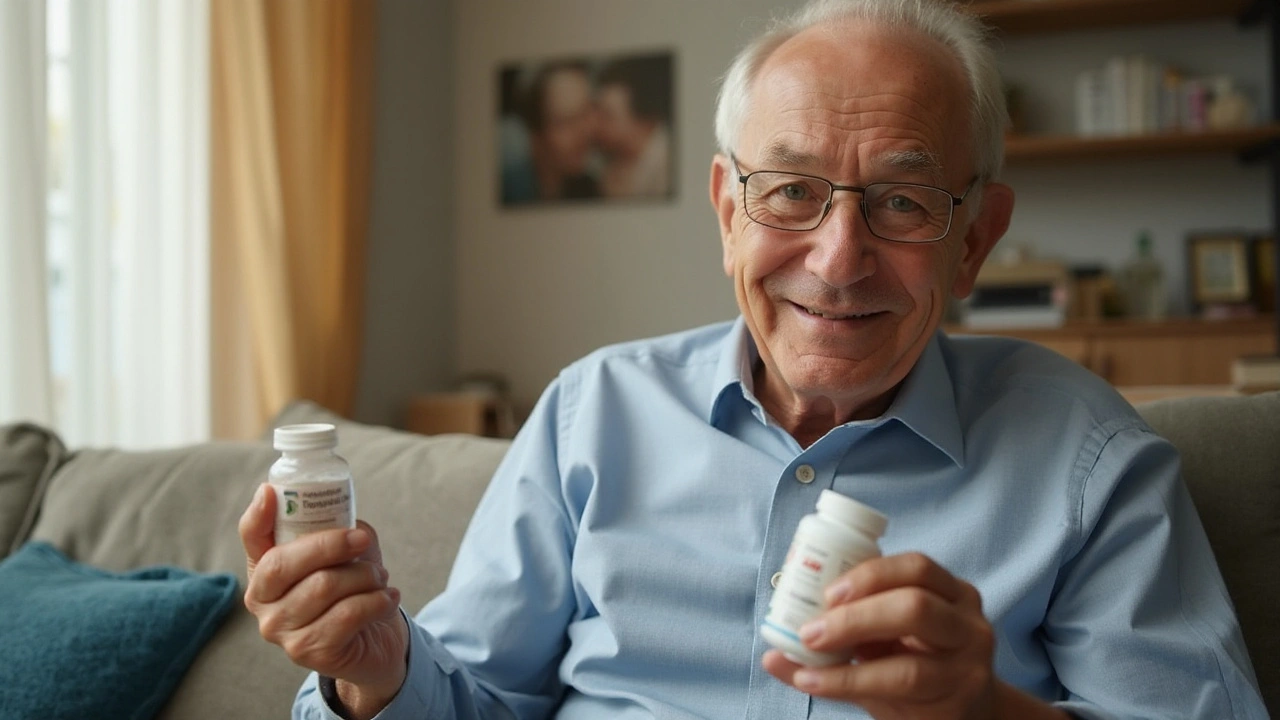Understanding Tiotropium Bromide's Effects on Mental Health in COPD Patients
 Aug, 7 2024
Aug, 7 2024
Chronic Obstructive Pulmonary Disease (COPD) is a life-long condition that can often feel overwhelming. The physical symptoms are challenging enough, but the impact on mental health can be equally daunting. Many patients experience anxiety, depression, and a decreased quality of life. Among the treatments available, tiotropium bromide has emerged as a key player, helping to manage the respiratory symptoms of COPD. However, an intriguing question arises: Does it also have an effect on mental health?
- Introduction to Tiotropium Bromide
- Mental Health Challenges in COPD Patients
- The Role of Tiotropium Bromide in Mental Health
- Practical Tips for Patients
Introduction to Tiotropium Bromide
Tiotropium bromide is a long-acting bronchodilator that plays a crucial role in managing chronic respiratory conditions such as Chronic Obstructive Pulmonary Disease (COPD). Approved by regulatory authorities around the world, this medication is primarily used to alleviate breathing difficulties by relaxing the muscles in the airways, making it easier for air to flow in and out of the lungs. Available in medication forms like inhalers, tiotropium bromide is often prescribed for daily use, ensuring consistent relief from persistent symptoms.
The drug belongs to a class of medications called anticholinergics, meaning it works by blocking the action of acetylcholine, a neurotransmitter that causes the muscles around the airways to contract. When these muscles are relaxed, the airways remain open, allowing patients to breathe more easily. According to scientific literature, tiotropium bromide has been found to significantly improve lung function, reduce exacerbations, and enhance the quality of life in individuals diagnosed with COPD.
It's fascinating to note that many patients report a noticeable improvement in their day-to-day activities after starting treatment with tiotropium bromide. Tasks that were once challenging, like climbing stairs or completing household chores, become more manageable. A patient might say, "Using tiotropium bromide has given me my life back," reinforcing the positive impact of this medication.
However, as with any medication, tiotropium bromide is not without its side effects. The most commonly reported ones include dry mouth, constipation, and urinary retention. While these side effects are usually mild, patients are encouraged to discuss any concerns with their healthcare providers to ensure they receive the best possible care. Understanding both the benefits and limitations of tiotropium bromide can help patients make informed decisions about their treatment plans.
Given the chronic nature of COPD, consistent medication use is essential for managing the disease effectively. Missing doses or irregular use can lead to exacerbations, hospitalizations, and a decline in overall health. Thus, adherence to prescribed medications, such as tiotropium bromide, is crucial. Studies have shown that regular use of bronchodilators like tiotropium bromide can reduce hospital admissions and improve survival rates among COPD patients.
It's also worth mentioning that tiotropium bromide is often used in combination with other medications, such as inhaled corticosteroids or long-acting beta-agonists. These combinations aim to provide more comprehensive management of COPD symptoms, addressing both inflammation and airway constriction. Healthcare providers work with patients to tailor treatment regimens that meet their specific needs and circumstances.
In summary, tiotropium bromide is a well-established and effective treatment for COPD. By improving lung function and reducing symptoms, it allows patients to lead more active and fulfilling lives. Ongoing research continues to explore the full potential of this medication, offering hope for even better treatments in the future. Whether you are a patient or a caregiver, understanding how tiotropium bromide works and its benefits can be an empowering step towards managing COPD more effectively.
"Tiotropium bromide has been shown to reduce both the frequency and severity of COPD exacerbations, making it an essential component of long-term disease management," notes a study published in the Journal of Respiratory Medicine.

Mental Health Challenges in COPD Patients
Living with Chronic Obstructive Pulmonary Disease (COPD) isn't just a physical battle; it takes a significant toll on mental well-being as well. Patients often face anxiety and depression, largely due to the constant struggle to breathe and the limitations it imposes on daily life. Studies have shown that up to 40% of COPD patients experience clinical depression. This isn’t just about feeling down – it severely affects their willingness to follow prescribed treatments and impacts their quality of life.
One of the main stressors for COPD patients is the uncertainty about the future. As the disease progresses, simple tasks like walking to the kitchen or taking a shower can become monumental challenges. This constant battle can lead to a sense of hopelessness and feeling isolated from social activities, friends, and even family. When people can't engage in activities they once enjoyed, it's natural for their mental health to suffer.
There is also the stigma associated with COPD, especially if it’s linked to smoking. Many patients feel judged and misunderstood, leading to social withdrawal and loneliness. Not only does this isolation exacerbate feelings of depression, but it also deprives them of potential support systems. Over time, this can solidify into chronic anxiety and panic attacks, triggered by the fear of breathlessness.
According to Dr. Christine Jenkins, a leading researcher in respiratory medicine, “The psychological aspects of COPD are often overlooked, but they are as crucial to address as the physical symptoms. Anxiety and depression negatively impact the patient’s ability to adhere to treatment and can worsen the overall prognosis of the disease.”
Financial stress can't be ignored either. Medical costs for managing COPD can be substantial, and many patients are unable to work due to their symptoms. This financial strain adds another layer of stress and can lead to feelings of inadequacy and a decreased sense of self-worth. The mental health burden is complex and multi-faceted, requiring a comprehensive approach to care and support.
Another aspect of mental health challenges in COPD patients is sleep disorders. Many individuals with COPD experience sleep disturbances, which can lead to fatigue and irritability. The lack of restful sleep can worsen both physical and mental health symptoms, creating a vicious cycle that is hard to break without proper intervention.
Dealing with COPD is undeniably challenging. However, understanding the mental health aspects of this condition is essential for providing holistic care. This includes recognizing symptoms of anxiety and depression, offering appropriate psychological support, and integrating these into the routine care plan of COPD patients. By doing so, we can improve not just their respiratory health, but their overall quality of life.

The Role of Tiotropium Bromide in Mental Health
Tiotropium bromide's primary function is to open the airways and improve breathing for COPD patients. When it comes to mental health, the connection might not be immediately obvious. However, improved breathing translates to more physical activity and better sleep, which can significantly boost mental well-being. The daily struggle to breathe lessens, reducing anxiety and depression which are prevalent in COPD patients.
One study published in the Journal of Clinical Psychiatry found that patients who experienced relief from physical symptoms also reported lower levels of anxiety and depression. Since COPD often restricts physical activity, it can lead to feelings of isolation and helplessness. With tiotropium bromide helping ease these symptoms, patients often feel a return to a semblance of normalcy, thereby improving their mental health.
“Breathing better means living better,” says Dr. Alicia Green, a leading pulmonologist. “Easier breathing helps patients regain some control over their lives, which is empowering. This has a direct impact on their mental state.”
Another aspect to consider is the reduction of hospitalization rates. Studies show that frequent hospital visits and stays can be incredibly draining, both physically and mentally. Tiotropium bromide has been shown to reduce the number of exacerbations leading to hospital visits. Fewer hospital trips mean less stress and anxiety, creating a more stable environment for mental health improvement.
Moreover, the effective management of COPD symptoms with tiotropium bromide allows patients to better engage in social activities and hobbies, which are vital for mental wellness. Interaction with family and friends, as well as participation in community activities, offers emotional support and a sense of belonging. This helps counteract the feelings of depression and loneliness that often accompany chronic illnesses like COPD.
It's also worth noting that a stable medication routine with visible improvements gives patients a sense of predictability and control. For people dealing with chronic illnesses where unpredictability is the norm, such consistency can be a much-needed stabilizing factor. When patients see tangible improvements in their physical health, it becomes easier to cultivate a positive mental outlook.
A study presented at the American Thoracic Society Conference highlighted that patients using tiotropium bromide showed an increased willingness to adhere to their medication regimes. This adherence leads to better overall health, reducing the psychological burden of dealing with frequent exacerbations and complications.
In conclusion, tiotropium bromide serves more than just as a remedy for respiratory symptoms. Its influence stretches into the realms of emotional and mental well-being, providing a holistic improvement for COPD patients. The drug reduces physical discomfort, which in turn helps to alleviate the emotional and psychological strain that comes with managing a chronic condition. So, while it may start in the lungs, its positive impact certainly travels to the mind as well.

Practical Tips for Patients
Living with Chronic Obstructive Pulmonary Disease (COPD) requires more than just managing physical symptoms; it also involves taking care of your mental health. The use of tiotropium bromide can improve respiratory function, but how can patients ensure they maintain a balanced mental state? Here are some practical tips designed to help.
First, it's crucial to understand the connection between physical and mental health. The feeling of breathlessness can create anxiety, which in turn can make breathing feel even more difficult. A simple technique to help manage this is breath awareness. By practicing mindful breathing exercises, you can help diminish feelings of anxiety and bring a sense of calm. Allocate time each day for mindful breathing; it could be as short as five minutes.
Daily Routines and Activities
Establishing a daily routine can be highly beneficial for COPD patients. Consistency in your day-to-day activities can provide a sense of normalcy and purpose, easing anxiety. Simple tasks like taking regular medication, light physical activity, and even engaging in hobbies can divert your mind from stress. Activities like reading, gardening, or watching a favorite TV show can bring a sense of accomplishment and joy.
Additionally, maintaining social connections is key. Whether it's family or friends, having a support system can make a world of difference. Isolation can often lead to depression, so make it a point to stay connected. Using technology, like video calls, can help bridge any physical distance and maintain relationships.
Healthy Lifestyle Choices
The importance of a healthy lifestyle can't be overstated. Eating a balanced diet and staying hydrated can have far-reaching effects on your mood and energy levels. Foods rich in Omega-3 fatty acids, such as fish, nuts, and seeds, have been shown to improve mental health. Consider consulting a nutritionist for a tailored diet plan.
Regular exercise, tailored to your capability, can also benefit mental health. Activities like stretching, light walking, or yoga can help release endorphins, the body's natural mood lifters. Always consult your doctor before starting any exercise regimen to ensure it's safe given your COPD condition.
Don’t overlook the power of good sleep. Poor sleep can exacerbate both COPD symptoms and mental health issues. Create a sleep-friendly environment by keeping the bedroom cool and dark and establish a bedtime routine to help signal to your body that it’s time to wind down.
Seeking Professional Help
If feelings of anxiety or depression become overwhelming, professional help should be sought immediately. Mental health professionals can offer various forms of therapy that may include cognitive behavioral therapy (CBT), which has proven effective in treating anxiety and depression. Medications may also be prescribed if necessary to help manage these conditions.
Dr. John Smith, a well-known pulmonologist, once said, “Managing COPD is just as much about taking care of the mind as it is about taking care of the lungs.” His words underline the importance of a holistic approach to COPD treatment.
For personalized advice, don't hesitate to ask your healthcare provider. They can recommend resources such as support groups, online forums, or local organizations that specialize in coping strategies for chronic illness.
Lastly, maintain an open line of communication with your doctor and healthcare team about your mental health. They'll appreciate knowing your struggles and can offer solutions you might not have considered. Living with COPD is undoubtedly challenging, but with the right tools, you can improve both your mental and physical health.

Shannon Amos
September 20, 2024 AT 08:55So let me get this straight - we’re now giving antidepressants to lungs? 🤔 Tiotropium bromide’s just chillin’ in the bronchi like, ‘I ain’t here for your anxiety, but hey, if you breathe better, maybe you’ll stop crying into your oxygen tank.’
stephen riyo
September 20, 2024 AT 23:16Wait, wait, wait-I’m confused… so, you’re saying, that, by relaxing the airway muscles, it’s, like, indirectly, reducing cortisol levels? Because, I mean, if you’re not gasping for air every five seconds, your amygdala probably stops screaming, right? Right??
Wendy Edwards
September 21, 2024 AT 23:23Y’all need to stop treating COPD like it’s just a lung problem. It’s a whole-body scream for help. When I started my inhaler, I cried because I could walk to the mailbox without feeling like I’d run a marathon. That’s not medicine-that’s magic. And yeah, my anxiety? It took a backseat. My brain finally got some peace. You don’t need a shrink if you can just breathe. 🙏
Jaspreet Kaur
September 22, 2024 AT 03:57When the body stops fighting just to exist the mind begins to remember it was meant to live not just survive. Tiotropium is not a drug it is a doorway. Many walk through it but few notice the light on the other side. Breath is the first prayer. We forget that
Gina Banh
September 23, 2024 AT 15:29Stop romanticizing this. Tiotropium doesn’t cure depression. It just stops you from dying before you can get to therapy. And yes, feeling less suffocated helps-but if your mental health is this bad, you need a psychologist, not just a bronchodilator. Don’t confuse symptom relief with healing.
Deirdre Wilson
September 23, 2024 AT 21:50It’s wild how breathing can feel like a superpower. Like, imagine if your phone battery went from 3% to 100% overnight-that’s what this drug did for me. Suddenly I could watch my grandkid’s soccer game without needing a nap after the first goal. It’s not just medicine, it’s… joy restoration? 🌈
Damon Stangherlin
September 25, 2024 AT 15:43I’ve been on tiotropium for 4 years now, and honestly, my biggest win wasn’t the lung function test-it was the day I didn’t cancel plans with my buddy because I was too scared to leave the house. That’s the real win. You don’t need a study to tell you that feeling safe in your own body matters.
Ryan C
September 25, 2024 AT 16:56Let’s be clear: tiotropium bromide has no direct serotonergic activity. Any mental health improvement is purely secondary to reduced hypoxia and increased mobility. Stop conflating physiological outcomes with psychiatric interventions. 🧠💊 #EvidenceBasedMedicine
Dan Rua
September 26, 2024 AT 21:02I love how this thread is turning into a group therapy session 😊 Honestly, I think we all just need to hear each other’s stories. I was skeptical at first, but now I tell everyone: if you’re struggling to breathe, try this. It’s not a miracle, but it’s a miracle *enough*.
Mqondisi Gumede
September 27, 2024 AT 21:57You Americans always think a pill fixes everything. In my country we use breathing exercises and fresh air. You sit in your AC apartment with your inhaler and call it progress. This is not medicine this is surrender
Douglas Fisher
September 28, 2024 AT 04:55I just want to say thank you to everyone who shared their stories here. It’s easy to feel alone when you’re fighting to breathe every day. But reading this? It made me feel seen. I’m not broken. I’m just healing. And that’s okay.
Albert Guasch
September 29, 2024 AT 11:29It is imperative to underscore that the observed psychological benefits associated with tiotropium bromide administration are, in fact, epiphenomenal manifestations of improved respiratory mechanics and concomitant attenuation of chronic hypoxemia. The pharmacological profile of this anticholinergic agent does not, in and of itself, modulate central nervous system neurotransmission in a manner directly attributable to affective regulation. Therefore, while anecdotal reports of enhanced quality of life are both compelling and clinically relevant, they must be contextualized within the broader paradigm of physiological homeostasis.
Ginger Henderson
September 30, 2024 AT 18:14So… you’re telling me the reason I stopped having panic attacks is because I can now walk to the fridge? That’s it? No wonder we’re all just medicating our way through life.